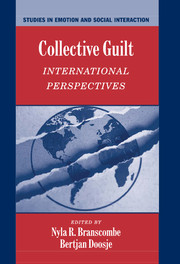Book contents
- Frontmatter
- Contents
- Preface
- List of Contributors
- Collective Guilt
- Section 1 Defining the nature of collective guilt
- Section 2 The Relationship Between Group Identification and Collective Guilt
- Section 3 Consequences for Intergroup Relations
- 11 Intergroup Forgiveness and Guilt in Northern Ireland: Social Psychological Dimensions of “The Troubles”
- 12 Intergroup Reconciliation Processes in Israel: Theoretical Analysis and Empirical Findings
- 13 On Whether to Apologize to Indigenous Australians: The Denial of White Guilt
- 14 Racial Wrongs and Restitutions: The Role of Guilt and Other Group-Based Emotions
- 15 Importance of Social Categorization for Forgiveness and Collective Guilt Assignment for the Holocaust
- Section 4 Commentary on the Volume
- Index
- References
11 - Intergroup Forgiveness and Guilt in Northern Ireland: Social Psychological Dimensions of “The Troubles”
Published online by Cambridge University Press: 05 January 2012
- Frontmatter
- Contents
- Preface
- List of Contributors
- Collective Guilt
- Section 1 Defining the nature of collective guilt
- Section 2 The Relationship Between Group Identification and Collective Guilt
- Section 3 Consequences for Intergroup Relations
- 11 Intergroup Forgiveness and Guilt in Northern Ireland: Social Psychological Dimensions of “The Troubles”
- 12 Intergroup Reconciliation Processes in Israel: Theoretical Analysis and Empirical Findings
- 13 On Whether to Apologize to Indigenous Australians: The Denial of White Guilt
- 14 Racial Wrongs and Restitutions: The Role of Guilt and Other Group-Based Emotions
- 15 Importance of Social Categorization for Forgiveness and Collective Guilt Assignment for the Holocaust
- Section 4 Commentary on the Volume
- Index
- References
Summary
In a society such as Northern Ireland, which is struggling to overcome the effects of prolonged violence, the concepts of forgiveness and collective guilt, although difficult, must be considered. After the euphoria that followed the “Good Friday Agreement,” the realities to be faced in the acquisition of peace have become apparent. The Good Friday Agreement, which received the support of 71 percent of the Northern Irish electorate, led to the setting up of a local assembly and a power-sharing government embracing all the major political parties. This assembly has, however, since collapsed.
The primary focus of our research has been intergroup forgiveness, but we have found it both useful and necessary to consider collective guilt as it relates to forgiveness in Northern Ireland. We first review the historical and social background to the political violence in Northern Ireland and explore psychological approaches to forgiveness. We consider the nature of intergroup forgiveness in Northern Ireland and review our own research on this issue.
Sectarian conflict in Northern Ireland
Although the conflict in Ireland can be traced back to before the sixteenth century Protestant Reformation in Western Europe (see McLernon et al., 2003), we refer primarily to the modern history. The Treaty of 1921 partitioned the island of Ireland into two sections: the predominantly Protestant six counties of the north, which remained an integral part of the United Kingdom, and the mainly Catholic twenty-six counties of the south, which separated from the United Kingdom and became known as “The Free State” (later the Republic of Ireland).
- Type
- Chapter
- Information
- Collective GuiltInternational Perspectives, pp. 193 - 215Publisher: Cambridge University PressPrint publication year: 2004
References
- 71
- Cited by



